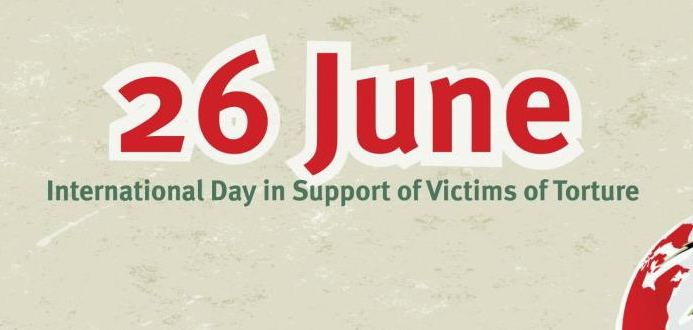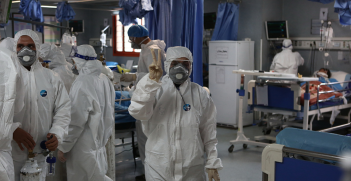“Torture is Not Just Alive and Well. It is Flourishing in Many Parts of the World.”

That was the stark assessment of Amnesty International’s global head, Salil Shetty, launching a new global campaign by the human rights organisation last month.
It is a depressing judgment shared by those of us working at the Victorian Foundation for Survivors of Torture and our fellow agencies of the Forum of Australian Services for Survivors of Torture and Trauma.
Each year we collectively provide counselling and related direct services to thousands of people from over 60 countries. Our clients have been subjected to physical and psychological violence including severe beatings, rape, electric shock, mock executions and kidnapping.
We will celebrate mightily the day we can lock up the office for the last time because no one else needs and wants our services. Paris will wipe the cobwebs from his surfboard and head to a great beach where the waves are glassy and peeling off perfectly. Josef will make a horrid mess constructing collages from sundry objects.
That occasion is not imminent.
26 June: International Day in Support of Victims of Torture
Thirty years have passed since the United Nations adopted the Convention against Torture and Other Cruel Inhuman and Degrading Treatment or Punishment, requiring states which have ratified it (now 155) to take effective action to prevent torture within their territories and bring perpetrators to justice. In honour of the Convention, 26 June is recognised as the UN International Day in Support of Victims of Torture.
There have been significant advances in the establishment of mechanisms to bring to justice some of the worst perpetrators of torture and other crimes – for example, the international criminal tribunals for Rwanda and the former Yugoslavia, and the permanent global International Criminal Court. In June representatives of 129 governments attended a Global Summit to End Sexual Violence in Conflict and agreed on steps to tackle impunity for the use of rape as a weapon of war.
Yet a profound gap persists between the promises of governments to prohibit and punish torture and its widespread prevalence. Around the world impunity is effectively in place and torturers are not deterred. According to Amnesty International at least 79 states which have ratified the convention against torture were torturing in 2014.
Public Attitudes Towards Torture
Amnesty also commissioned a survey of public attitudes towards torture in 21 countries and found striking differences. A majority of people in China, India, Kenya, Nigeria, Pakistan and Indonesia agreed that torture is sometimes necessary and acceptable to gain information that may protect the public. In the USA opinion was almost evenly split – 45% agreed and 53% disagreed.
Australians were strongly opposed, only 21% agreeing torture could sometimes be justified. Paris experienced a moment of ethnic pride that Greek respondents were the most strongly opposed, which may reflect the brutality of the 1967-74 military dictatorship seared into the citizens’ memories.
Australia’s Record with Respect to Torture
It is certainly welcome that there are relatively few allegations that Australian officials have committed torture (defined by the convention as intentionally inflicting severe pain or suffering or acquiescing in such conduct by private citizens). It is to be applauded that we have a world class program of assistance to refugee survivors of torture and trauma funded by the Commonwealth Government with additional support from state governments, philanthropic organisations and private donors. However, we should not be complacent.
The nation’s record is blemished with respect to “other cruel, inhuman or degrading treatment” which is also prohibited under the torture convention and other international legal standards which Australia has committed to respect. Of specific concern to our agency is the prolonged and indefinite detention of people recognised as refugees who are subject to adverse security assessments by the Australian Security Intelligence Organisationwithout independent, judicial scrutiny of their cases.
In 2012 the UN Human Rights Committee found that their treatment violated the International Covenant on Civil and Political Rights which provides that “No one shall be subjected to torture or to cruel, inhuman or degrading treatment or punishment” (Article 7). In the Committee’s opinion, “the combination of the arbitrary character of [their] detention, its protracted and/or indefinite duration, the refusal to provide information and procedural rights to [them] and the difficult conditions of detention are cumulatively inflicting serious psychological harm upon them, and constitute treatment contrary to… the Covenant.”
Detention is a context where people are particularly vulnerable to abuse by those who have power over them. For that reason, a special international agreement – the Optional Protocol to the Convention against Torture – was concluded in 2002 that provides for monitoring and other measures specifically designed to protect people deprived of their liberty in prisons and other locations against mistreatment. The Australian Government signed the Optional Protocol in 2009 indicating it was committed to its formal adoption and implementation but the process was not completed before the election of 2013. The present government has not (to our knowledge) expressed support for Australia becoming a party to this convention and when previously in power the Coalition was not in favour. It would be highly regrettable if we did not proceed to ratify as there are significant deficiencies in the arrangements for monitoring the numerous and diverse places of detention of the Commonwealth, State and territory governments.
Hope for the Future
Come 26 June next year, we have hope that the balance sheet will be better. There will of course be reports of terrible instances of torture committed in multiple places. But we also hope that a perpetrator or two who thought they were safe will have been brought to justice; and that a credible inquiry will have been initiated into the conduct of a regime whose leaders just wanted to move on without accountability for past crimes. Contemplating the persistence and prevalence of torture can be overwhelming. However we consider ourselves fortunate to have access to the most powerful antidote to despair: witnessing the resilience of people who have experienced some of the most awful things humans do to others.
Paris Aristotle AM is the Chief Executive Officer of the Victorian Foundation of Survivors of Torture (VFST), also known as Foundation House. Josef Szwarc is the Research and Policy Manager at Foundation House.





